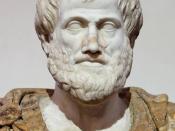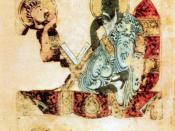How does Aristotle explain change, and how is this different from Plato's account? What is Aristotle's solution to the problem the One and the Many? To what extend can appeals to Aristotle's four causes be considered "scientific" explanations of phenomena?
Introduction
Greek philosophers are considered to be the founders of modern philosophy. Their thoughts, ideas, assumptions and understandings about the world lead to the foundation of thought later in history. Aristotle, a Greek philosopher, born in 384 B.C., and was a follower of Plato. However, Aristotle had a view of change that differed from the one of Plato. In Section 1-Aristotle's Change, the views on change by Aristotle will be presented as well as how it may differ in the views of Plato. In Section 2-One and the Many, it will explain how Aristotle solves the problem of the One and the Many that philosophers in the past could not grasp completely.
Section 3-Aristotle's Four Causes, explains what the four causes are how they can be considered scientific explanations of phenomenon.
Aristotle's Change
Even though Plato and Aristotle had been associated together for a long period of time, Aristotle could not accept Plato's theory of forms. Plato believed that, "Reality in its perfect fullness, is possessed only by the eternal forms, which are dependent on nothing else for their existence" (Lindberg, 48). With the theory of forms, Plato stated that every object in itself is controlled by an eternal form that does not change. An object comes from a preset model or mold, which gain their characteristics from the model. However, Aristotle believed that objects had "autonomous existence", an existence that could not be controlled by an eternal form, and this existence made up the real world. Aristotle, a zoologist, observed dogs greatly and came to the conclusion that...


